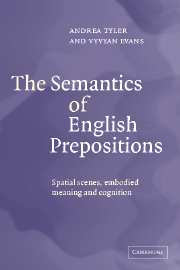Book contents
- Frontmatter
- Content
- Preface
- Acknowledgements
- 1 The nature of meaning
- 2 Embodied meaning and spatial experience
- 3 Towards a model of principled polysemy: spatial scenes and conceptualization
- 4 The semantic network for over
- 5 The vertical axis
- 6 Spatial particles of orientation
- 7 Bounded landmarks
- 8 Conclusion
- References
- Index
3 - Towards a model of principled polysemy: spatial scenes and conceptualization
Published online by Cambridge University Press: 22 September 2009
- Frontmatter
- Content
- Preface
- Acknowledgements
- 1 The nature of meaning
- 2 Embodied meaning and spatial experience
- 3 Towards a model of principled polysemy: spatial scenes and conceptualization
- 4 The semantic network for over
- 5 The vertical axis
- 6 Spatial particles of orientation
- 7 Bounded landmarks
- 8 Conclusion
- References
- Index
Summary
In chapter 1 we saw that a spatial particle such as over has a number of distinct meanings or senses associated with it. We reviewed two positions that have been proposed to account for the relationship between such distinct meanings. The first, homonymy, holds that the meanings associated with a particular form are simply stored in the mental lexicon, as unique entries. While this position may sometimes be justified based on synchronic evidence – for example, the river bank versus the bank of England – in the case of a spatial particle, such as over, it demonstrably is not. For instance, Sandra and Rice (1995), and Rice et al. (1999) have found, based on a series of psycholinguistic experiments, that native speakers of both English and Dutch tend to recognize relationships between distinct meanings associated with the same spatial particle. The homonymy position ignores any shared similarities and interrelationships between the meanings of a form such as over, and would predict that native speakers would fail to find a relationship between the various meanings in a consistent inter-speaker way.
The second position, monosemy, assumes one highly abstract meaning, from which all other meanings are simply contextual variants. However, as we have already observed, some meanings associated with a particular form are context independent. That is, the range of meanings associated with an individual form such as over is so diverse that they cannot be straightforwardly inferred from a single abstract meaning as it occurs in context.
Information
- Type
- Chapter
- Information
- The Semantics of English PrepositionsSpatial Scenes, Embodied Meaning, and Cognition, pp. 37 - 63Publisher: Cambridge University PressPrint publication year: 2003
